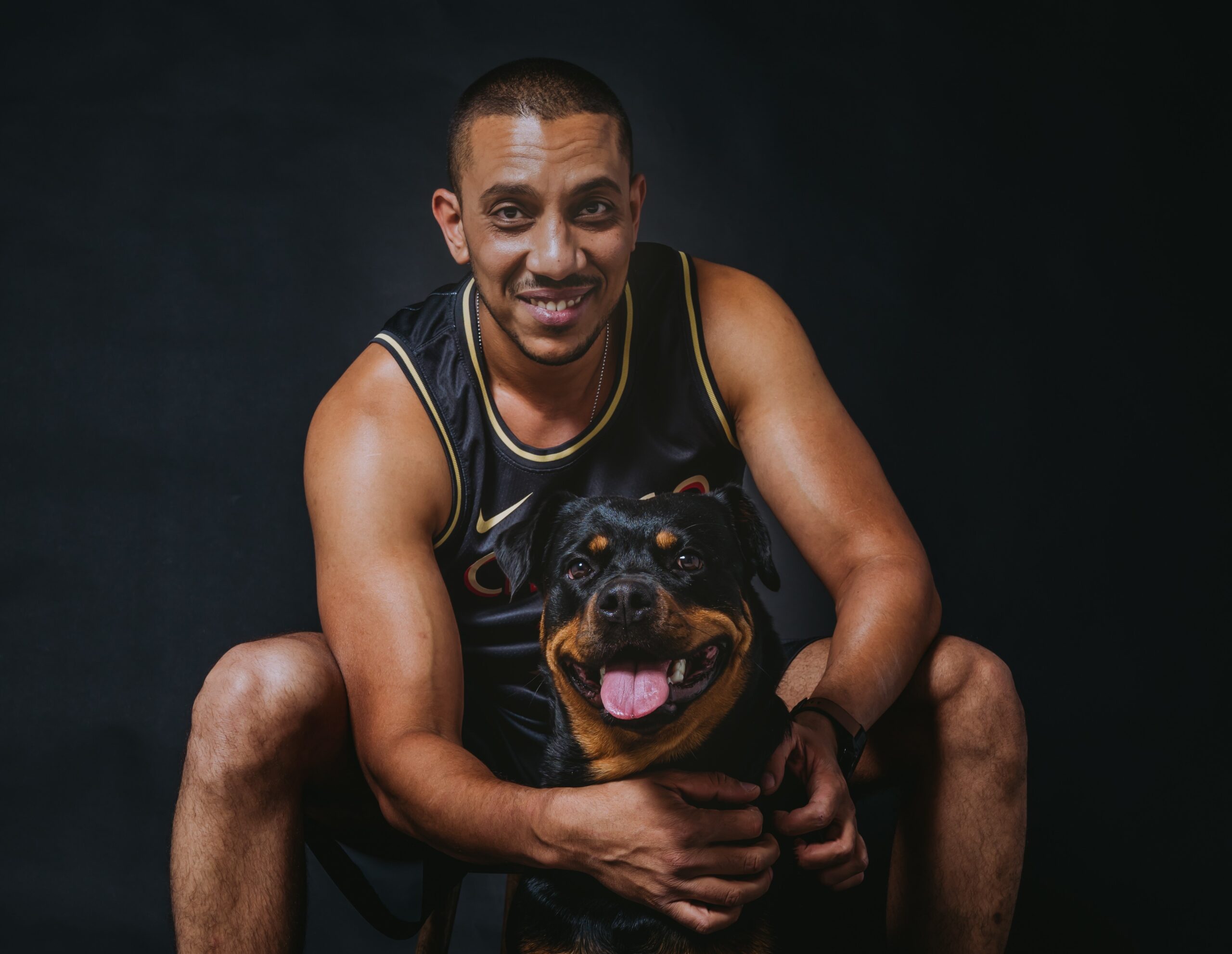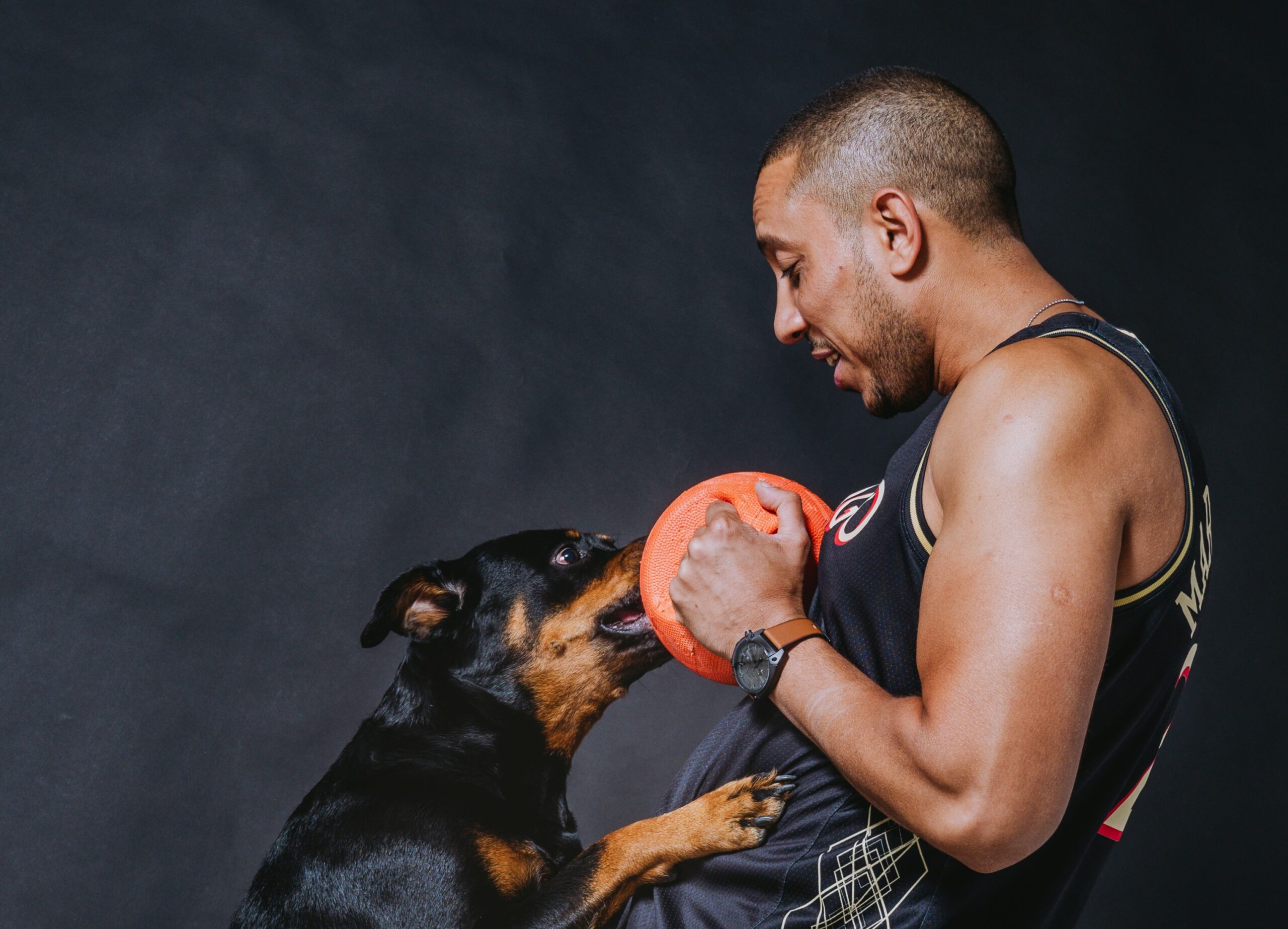A Middle Eastern pharmacist wanted to raise his Rottweiler puppy with kindness. He found VSA and opened up a whole new world.

Becoming a dog trainer was never part of Amr Nawwar’s plan. The Egyptian-born pharmacist had such an intense fear of dogs that he would cross the street just to avoid them. Today, Amr is a VSA-Certified Dog Trainer living in Dubai and a passionate advocate for positive training methods. Through social media, he is actively reshaping how dogs are perceived and treated in the Middle East, helping both guardians and trainers embrace science-based, humane training.
In this exclusive interview, Amr shares his inspiring journey, the cultural challenges he is working to overcome, and his mission to bring ethical dog training to Arabic-speaking communities.
VSA: Your journey into dog training is incredible. How did it all start?
Amr Nawwar: It still feels surreal! I never imagined myself in this field. I was a pharmacist, and my fear of dogs was extreme—I wouldn’t visit friends who had dogs, and if I saw one on the street, I’d switch sidewalks.
Everything changed when a friend of mine, who had a Rottweiler, jokingly asked if I wanted a puppy. A year later, she surprised me with Molly, and suddenly, I found myself responsible for a dog.
I’m someone who likes to do things the right way, so I started researching how to raise and train her. But the advice I came across didn’t feel right—things like “never let your dog sit next to you” or “you must be the pack leader and always walk ahead.” People told me to use choke chains and harsh corrections, but it didn’t sit well with me. I knew there had to be a better way.
VSA: What led you to choose the Victoria Stilwell Academy (VSA)?
AN: When I first discovered positive reinforcement training, I realized I needed proper education to understand the science behind it. I had been following Victoria Stilwell’s work for a while and admired her ethical, research-driven approach.
I looked into VSA’s curriculum and philosophy, and it became clear that this wasn’t just another certification—it was an in-depth education in humane, evidence-based training. They didn’t just teach techniques; they taught critical thinking, communication with clients, and how to advocate for ethical practices. That was exactly what I was looking for.
VSA: How was your experience studying at VSA? What was the most valuable takeaway?
AN: Studying at VSA was one of the best decisions I’ve ever made. From day one, I felt like I had stepped into a whole new world of knowledge. The instructors—Victoria Stilwell herself, alongside some of the top experts in the field—didn’t just teach training techniques; they explained the science behind behavior, canine psychology, and why positive reinforcement is both effective and ethical.
One of the biggest lessons I learned was how to truly observe and understand dogs. It’s not just about teaching commands—it’s about communication. Dogs are always telling us how they feel, but if you don’t know what to look for, you’ll miss it. VSA taught me to be patient, to listen, and to always prioritize the dog’s emotional well-being.
VSA: Did VSA change the way you approach training?
AN: Absolutely. Initially, I was just learning for my own dog. But as I progressed through the program, I realized I had a responsibility to share this knowledge. So many people in my community were following outdated, dominance-based methods that harm dogs. I knew I had to step up and become a voice for humane training.
Another big shift was in how I communicate with people about their dogs. VSA emphasized the importance of working with people just as much as working with dogs. I learned how to meet people where they are, understand their concerns, and show them why positive reinforcement is not only kinder but also more effective. It’s not about judging people—it’s about educating and inspiring them to change.

VSA: What was the turning point that led you to become a full-time dog trainer?
AN: Initially, I wasn’t thinking about changing careers. I was a pharmacy branch manager, and after work, I would just spend time training my dog for fun. But in late 2023, the Gaza war caused my company—one that owned the Starbucks franchise in the Middle East—to lay off thousands of employees, including me.
For the first time in my life, I had the chance to step back and reflect. I realized that I had been unhappy as a pharmacist for years. Wearing that lab coat every day felt like being restrained in a prong collar—it just didn’t feel right.
But when I was with Molly, training her and learning about behavior, I felt alive. That’s when I made the leap and decided to pursue dog training full-time.
VSA: Did your background in pharmacy influence your approach to dog training?
AN: Surprisingly, yes. Pharmacy is all about science, precision, and understanding how different compounds interact. That analytical mindset carries over into dog training—because at its core, training is also a science. You need to understand behavior, reinforcement schedules, and environmental influences.
Also, in pharmacy, I had to communicate complex information to customers in a clear, reassuring way. Now, I do the same when explaining behavior and training methods to dog owners. It helps me build trust with clients and make science-based training more accessible.
VSA: You’re very active on social media. What’s your mission there?
AN: Social media is a powerful tool, and I’m using it to fight misinformation about dogs in the Arab world.
One of the biggest myths I tackle is the misconception that Islam forbids having dogs. There’s nothing in the Quran that says you can’t have a dog—it’s all based on interpretations of certain sayings, but historical records show that even the Prophet’s companions had dogs.
Another major issue is the dominance myth. Many trainers still use outdated methods, thinking they need to “dominate” their dogs. Instead of simply saying “positive reinforcement is better,” I frame my arguments around science—because people can argue opinions, but they can’t argue facts.
VSA: Have your social media efforts made an impact?
AN: Absolutely. My TikTok account, which I started just a year ago, has grown to over 50,000 followers. Every day, I receive messages from people who have changed the way they interact with their dogs because of my content.
Even professional trainers have reached out to tell me they’ve switched to positive methods after speaking with me—and that they’ve noticed not only a difference in the dogs but also in themselves. One Egyptian trainer with ten years of experience told me, “Since I stopped using harsh methods, I’ve become calmer, less stressed, and even my sleep and relationships have improved.” That was one of the most rewarding messages I’ve ever received.
VSA: What’s next for you?
AN: Right now, I’m focused on building my training business in Dubai while continuing my online advocacy. I also want to translate more science-based dog training materials into Arabic and maybe even work with VSA to bring more Arabic-speaking trainers into the field.
I’m committed to spreading what I’ve learned from VSA and leading experts like Brian Hare, Alexandra Horowitz, Gregory Berns, Patricia McConnell, Karen Pryor, and Susan Garrett—all professionals who uphold the highest ethical standards and never compromise on humane training.
This is just the beginning. My goal is to make science-based training the norm in the Middle East.
Learn more about preparing for a rewarding career as a dog trainer with VSA’s premier Dog Trainer Course.



